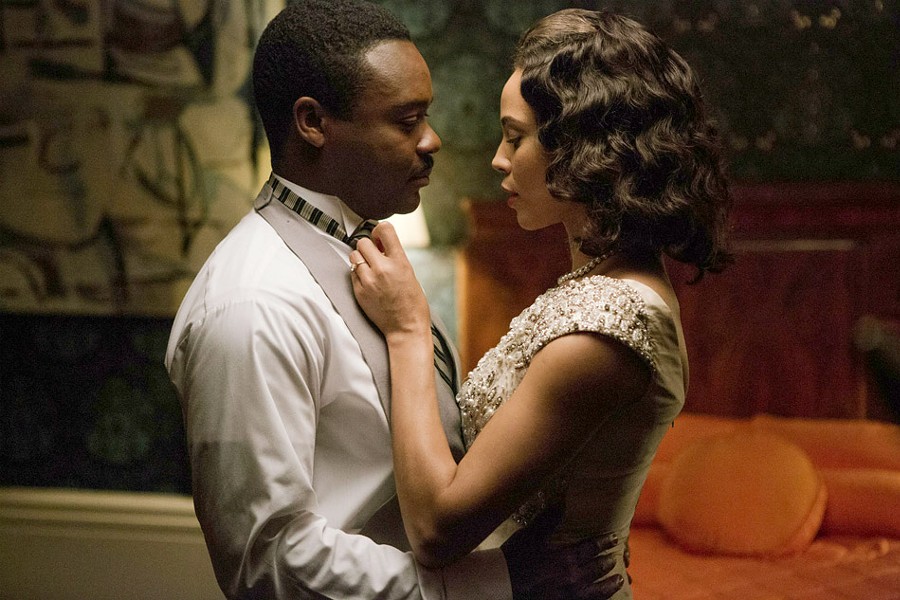The time is right for a film like "Selma." Though director Ava DuVernay's focus is the riveting behind-the-scenes story of a pivotal moment in the civil rights movement -- documenting Martin Luther King Jr.'s campaign to get the Voting Rights Act passed by staging marches from Selma, Alabama, to the state capitol in Montgomery -- the way in which the history it presents is reflected in the recent protests in Ferguson, Missouri, New York City, and all around the country (including here in Rochester), lends the film an immediacy that's lacking from your standard, glossy, Oscar bait-y biopics. As the film looks back, it offers some insight to where we are right now. It offers a harsh reminder that the injustices it depicts are still with us, but reminds us that no matter how bad things seem, there's always hope for change.
Beginning just after the passing of the 1964 Civil Rights Act, which ended segregation in the South, the film opens with scenes that offer an explanation as to why King (British actor David Oyelowo) decided Alabama was the right place to wage this particular battle. The film depicts the 1963 bombing of a church in Birmingham which left four little girls dead, as well as smaller actions like the voter suppression tactics practiced by state officials to keep blacks out of the voting booths (another way in which the films reminds us how little things have changed). As King arrives in town, flanked by his inner circle and members of the Southern Christian Leadership Conference, he meets with local activists to prepare the proper course of action as they square off against Alabama's racist governor, George Wallace (Tim Roth).
King remains the central figure, but DuVernay makes a point to show how the movement's accomplishments were the result of these activists, religious leaders, and students working together. Some of the films meatiest scenes revolve around heated debates among the group about where to focus their energies and what tactics will be most effective to advancing the cause. The way the script dramatizes the strategizing, maneuvering and occasional missteps required to change history is thrilling to watch.
The films also depicts King's meetings with Lyndon B. Johnson (Tom Wilkinson), as the men negotiate how much support the president will offer the movement. DuVernay has faced some criticism over the accuracy of these scenes and the way the film suggests that Johnson wasn't as immediately supportive as he should have been. Whether or not it's historically accurate, I found it to be a fair portrayal -- it's clear Johnson is not unsympathetic to the cause, just overly pragmatic about the pressures he faces on any number of issues, all crucial to the running of a nation, where his priorities should lie. It's a nuanced portrayal, which contrasts with the film's depiction of Governor Wallace, who as written and performed, comes across as too much of a caricatured villain.
"Selma" is equally frank and unflinching in its depiction of the movement's physical battles, during events like "Bloody Sunday," when the demonstrators' first attempt to march results in a virtual bloodbath as they attempt to cross the Edmund Pettus Bridge. Watching the horror unfold, it's impossible not to draw parallels between the sight of protesters tear gassed and beaten and the nearly identical images that dominated the national news just a few months ago. But here, the camera refuses to allow us to remain a casual observer, and we're placed squarely in the line of fire. Here the film's brilliant cinematographer, Bradford Young, proves equally capable of capturing brutality as he is at creating stunningly beautiful compositions.
Despite being produced by Oprah Winfrey (who takes on a small role as real-life voting rights activist Annie Lee Cooper), DuVernay and screenwriter Paul Webb weren't granted the rights to King's speeches, forcing them to use paraphrased versions of his orations, but the fact that you'd never notice speaks to the strength and power of the writing. They're aided by Oyelowo's magnificent, charismatic performance. His richly textured portrayal presents King as a thoughtful man who's often confounded by the weight that rests on his shoulders. Though epic in scope, "Selma" maintains a startling intimacy. It plays into the way the filmmakers avoid hagiography, not treating King as a saint or avoiding his indiscretions -- there's a tense scene in which his wife, Coretta (played with grace and great strength by Carmen Ejogo), confronts him about his infidelities. But these imperfections serve to make his achievements all the more remarkable. It gains power from showing that for all of King's famous dreaming, what really made the difference was the hard work an entire community was willing to put in. In doing so, "Selma" allows us to see both how far we've come as a nation, and how long a journey we still have before us.
